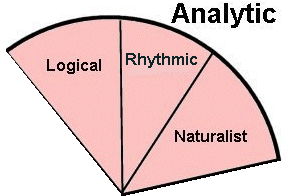THE ANALYTIC DOMAIN

THE ANALYTIC DOMAIN

The analytic domain consists of the logical, rhythmic and naturalist intelligences. These are the intelligences that promote analysis of knowledge that is presented to the learner.
Consider Ms. Gamboro's class. They have created instruments that simulate the sounds of the rain forest, and each child is now creating his or her own composition that makes use of these sounds. As a child comes before the class to present and conduct his or her composition, students must follow the patterns of sound and imitate them accurately in order to successfully perform the piece. There is a careful auditory analysis of each rhythm presented to the class, and in cases where the student has created sheet music with symbols for the different instruments as they play, there is visual analysis of patterns evident as well.
Then consider that the logical intelligence has a highly analytical component. Li and Marla are working to create a bridge out of popsicle sticks that will be able to hold the weight of a motorized twelve-pound truck as it crosses their structure. They have studied many kinds of bridges and they are employing what they have learned to make a structure strong enough to successfully do the job. As they attempt different designs, they are careful to analyze their failures and build on their successes. After two weeks of working a little every day, Marla and Li come up with a design that is effective in safely holding the truck's weight. Problem solving is a very analytical process!
Finally, consider Shanae, who is sorting leaves by different attributes at a first grade learning center. She sorts them by color, then by size, then by texture. As she comes up with a classification system for the leaves that makes sense to her, she glues each leaf down on a large sheet of paper that serves as an organizer. She then presents her leaf classification system to be displayed in the classroom so that children can compare and contrast one another's strategies for classification.
I characterize these three intelligences as analytic because even though they can have a social or introspective component to them, they most fundamentally promote the process of analyzing and incorporating data into existing schema. The analytical intelligences are by their nature heuristic processes.
http://surfaquarium.com/MI/mi_domain_analytic.htm
Copyrightę2002-2014
No
portion of this page may be cited, copied, repreinted or distributed
without written permission